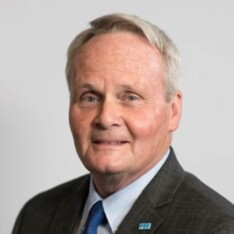Reprinted from the Intercollegiate Studies Institute
How rare and refreshing it is for the powerful to understand the limitations of power and actually repudiate its use, in effect giving it back to the individuals who make up society.
George Washington was such a leader. Cicero was another. So was Ludwig Erhard, who did more than any other person to denazify the German economy after World War II.
“In my eyes,” Erhard confided in January 1962, “power is always dull, it is dangerous, it is brutal and ultimately even dumb.”
By every measure, Germany was a disaster in 1945—defeated, devastated, divided, and demoralized—and not only because of the war. The Nazis, of course, were socialist (the name derives from National Socialist German Workers Party), so for more than a decade the German economy had been “planned” from the top. It was tormented with price controls, rationing, bureaucracy, inflation, cronyism, cartels, misdirection of resources, and government command of important industries. Producers made what the planners ordered them to. Service to the state was the highest value.
Ludwig Erhard reversed those practices, and in doing so he gave birth to a miraculous economic recovery.
Classical Liberal
Born in Bavaria in 1897, Ludwig Erhard was the son of a clothing and dry goods entrepreneur. Erhard’s father was, in the words of biographer Alfred C. Mierzejewski, “by no means wealthy” but “a member of the solid middle class that made its living through hard work and satisfying the burgeoning consumer demand of the period, rather than by lobbying for government subsidies or protection.”
As a teenager, Ludwig heard his father argue for classical-liberal values in discussions with fellow businessmen. Young Ludwig resented the burdens that government imposed on honest, independent businessmen like his father. He developed a lifelong passion for free-market competition because he understood what F. A. Hayek would express so well in the 1940s: “The more the state ‘plans,’ the more difficult planning becomes for the individual.”
The younger Erhard’s classical-liberal values were strengthened by his experience in the bloody and futile First World War. While serving as an artilleryman in the German army, he was severely wounded by an Allied shell in Belgium in 1918. He began studying economics as tumultuous hyperinflation gripped Germany, rendering savings, pensions, and investments worthless and wiping out the German middle class.
Erhard earned his PhD in 1925, took charge of the family business, and eventually headed a marketing research institute, which gave him opportunities to write and speak about economic issues. Hitler’s rise to power in the 1930s deeply disturbed Erhard. He refused to have anything to do with Nazism or the Nazi Party and quietly supported resistance to the regime. The Nazis saw to it that he lost his job in 1942, when he wrote a paper outlining his ideas for a free postwar economy. He spent the next few years as a business consultant.
Erhard’s ideas received a new hearing after the Allies defeated the Nazis. In 1947 he became chair of an important monetary commission. It proved to be a vital stepping-stone to the position of director of economics for the Bizonal Economic Council, a creation of the American and British occupying authorities. There he could finally put his views into practice and transform his country in the process.
Turnaround Artist
Erhard’s beliefs had by this time solidified into convictions. Currency must be sound and stable. Collectivism was deadly nonsense that choked the creative individual. Central planning was a ruse and a delusion. State enterprises could never be an acceptable substitute for the dynamism of competitive, entrepreneurial markets. Envy and wealth redistribution were evils.
“It is much easier to give everyone a bigger piece from an ever division of a small cake, because in such a process every advantage for one is a disadvantage for another.”
Erhard advocated a fair field and no favors. His prescription for recovery? The state would set the rules of the game and otherwise leave people alone to restart the German economy. In June 1948 he “unilaterally and bravely issued a decree wiping out rationing and wage-price controls and introducing a new hard currency, the Deutsche-mark,” in the words of the economist William H. Peterson.
Erhard did so “without the knowledge or approval of the Allied military occupation authorities” and made the decree “effective immediately.”
Peterson continues:
The American, British, and French authorities, who had appointed Erhard to his post, were aghast. Some charged that he had exceeded his defined powers, that he should be removed. But the deed was done. Said U.S. Commanding General Lucius Clay: “Herr Erhard, my advisers tell me you’re making a terrible mistake.” “Don’t listen to them, General,” Erhard replied, “my advisers tell me the same thing.”
General Clay protested that Erhard had “altered” the Allied pricecontrol program, but Erhard insisted he hadn’t altered price controls at all. He had simply abolished them.
In 1949 Erhard won a seat in the Bundestag (the German parliament) in the first free elections since 1933. In the subsequent government of Chancellor Konrad Adenauer, he was appointed the first economics minister of the newly constituted West German republic, a role he would hold until 1963.
In that position he issued a blizzard of deregulatory orders. He slashed tariffs. He raised consumption taxes, but more than offset them with a 15 percent cut in income taxes. By removing disincentives to save, he prompted one of the highest saving rates of any Western industrialized country. West Germany was awash in capital and growth, while communist East Germany languished. Economist David Henderson writes that Erhard’s motto could have been “Don’t just sit there; undo something.”
The results were stunning. Writing in the December 1988 issue of The Freeman, Robert A. Peterson (not to be confused with the aforementioned William H. Peterson) explained:
Almost immediately, the German economy sprang to life. The unemployed went back to work, food reappeared on store shelves, and the legendary productivity of the German people was unleashed. Within two years, industrial output tripled. By the early 1960s, Germany was the third greatest economic power in the world. And all of this occurred while West Germany was assimilating hundreds of thousands of East German refugees.
The pace of growth dwarfed that of European countries that received far more Marshall Plan aid than Germany ever did.
The Principles of Liberty
The incredible turnaround of the 1950s became widely known as the “German economic miracle,” but Erhard never thought of it as such. In his 1958 book, Prosperity through Competition, he wrote: “What has taken place in Germany . . . is anything but a miracle. It is the result of the honest efforts of a whole people who, in keeping with the principles of liberty, were given the opportunity of using personal initiative and human energy.”
The temptations of the welfare state in the 1960s derailed some of Erhard’s reforms. His three years as chancellor (1963–66) were less successful than his tenure as economics minister. But his legacy was forged in that decade and a half after the war’s end. He forever answered the question “What do you do with an economy in ruins?” with the simple, proven recipe: “Free it.”




